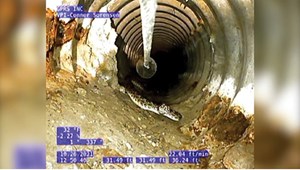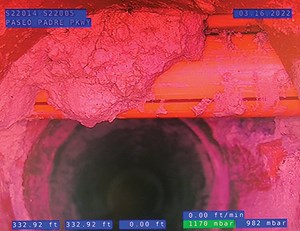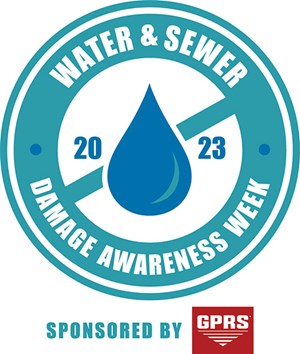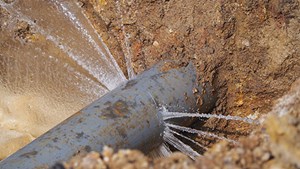October 2023 Vol. 78 No.10
Features
GPRS launches Water & Sewer Damage Awareness Week
Goal to Increase Awareness About Threats to Water, Wastewater Infrastructure
(UI) — Kyle Humphreys has seen it all.
As the director of pipe inspection services at Ground Penetrating Radar Systems LLC (GPRS), he has a birds-eye view of the thousands of inspections that the national firm conducts annually on wastewater systems across all 50 United States.
Water & Sewer Damage Awareness Week (WSDAW) runs from Oct. 23–27.
With remote-controlled crawlers equipped with closed-circuit television cameras, GPRS Project Managers inspect every nook and cranny of these lines searching for structural defects that can cause service interruptions, or otherwise negatively impact the communities that rely on these systems.
Project managers expect to find certain things when they inspect a line: a baseball that washed into a storm drain and is now plugging a pipe; a clog caused by yard debris; a line shattered by invasive tree roots.
Then there are the more unique finds. In one instance, a crawler came face-to-lens with a rattlesnake that had taken up residence in a compromised pipe.

Humphreys says the root cause behind all these problems is the same: infrastructure that was left too long without proper maintenance and inspection.
“It’s a great idea to do bi-annual video pipe inspections of your sewer systems,” he said. “Otherwise, you never know what could be in your lines. We’ve seen anything and everything.”
To increase awareness of the risks facing water and wastewater infrastructure, and the practical strategies that municipalities, facility owners and other entities can take to protect these systems, GPRS has launched a new safety initiative called Water & Sewer Damage Awareness Week (WSDAW).
Comp opportunities
From Oct. 23–27, GPRS will offer free safety presentations to anyone responsible for water and/or wastewater systems. The firm will also share additional safety information throughout the week on its social media channels.
GPRS Senior Vice President of Marketing and SiteMap Product Executive Jason Schaff explains that WSDAW is designed to help these groups retake control of their infrastructure.
“Utility infrastructure, and specifically sewer infrastructure, is in bad shape,” Schaff said. “Water is becoming scarcer. WSDAW is positioned to help address some of these issues with simple and practical solutions.”
In 2021, the American Society of Civil Engineers (ASCE) gave America’s overall infrastructure a C- on its biannual infrastructure report card. The United States received a C- in the category of drinking water, D for its stormwater infrastructure and D+ for wastewater.
The U.S. loses approximately six billion gallons of drinking water a day to subsurface leaks and water main breaks. The federal government estimates 10 to 30 percent of the average water distributor’s supply ends up seeping into the ground, as what is known as non-revenue water loss.
This lost water doesn’t just cost communities money and deprive them of a valuable resource; it’s also potentially dangerous. Undetected leaks can compromise structural components of the surrounding infrastructure, leading to sinkholes, mudslides and other disasters.
“Money is literally leaking out of our pipes every day,” Schaff said. “There are some great, proactive approaches that WSDAW will bring to light – not only saving money, but increasing safety and decreasing project delays.”
Cross bores
On the wastewater side, cross bores are a major threat that communities face.
Cross bores are inadvertent intersections of an existing underground utility or structure with a new utility installed using trenchless technology such as directional drilling. These intersections create costly, and often hazardous situations that, if left untreated, could result in service interruptions, at best; and cost lives in the most extreme cases.
“In our industry, the majority of what we see is telecommunication lines, gas lines, or fiber lines intersecting with sewer or storm lines,” Humphreys said. “When you’re talking about gas lines, a cross bore could result in gas leaking into a home or business, which could cause an explosion.”
The Cross Bore Safety Association estimates that there are up to a million undetected cross bores riddling America’s infrastructure.
GPRS found 10 such utility intersections when it conducted sewer line inspections in Fremont, Calif., where a large telecommunications firm had recently completed a significant fiber installation project.
The city of Fremont requires that contractors installing utility lines of any kind hire a CCTV firm to inspect for cross bores both before and after the new lines are installed.

The telecommunications company employed a different CCTV company to inspect the city’s sewer system before installing the fiber. It hired GPRS to conduct the post-installation inspection after the other firm pulled out of the job due to its size and scope.
Humphreys says Fremont’s mandate of pre- and post-cross bore inspections should be the model adopted by all municipalities in the U.S. If the city didn’t mandate those inspections, it’s likely those 10 cross bores would have gone undetected until disaster struck.
“I would suggest all municipalities require these inspections any time that directional drilling is being done,” Humphreys said. “We like to be proactive, rather than reactive. It’s going to save you money in the long run. Repairs to sewer and storm systems – if you let (the problems) go, then by the time you find the problems it’s going to be a major, major cost to get that repaired.”
FOR MORE INFORMATION
Please visit GPRS at gp-radar.com and to learn more about WSDAW please visit WSDAW.org.






Comments